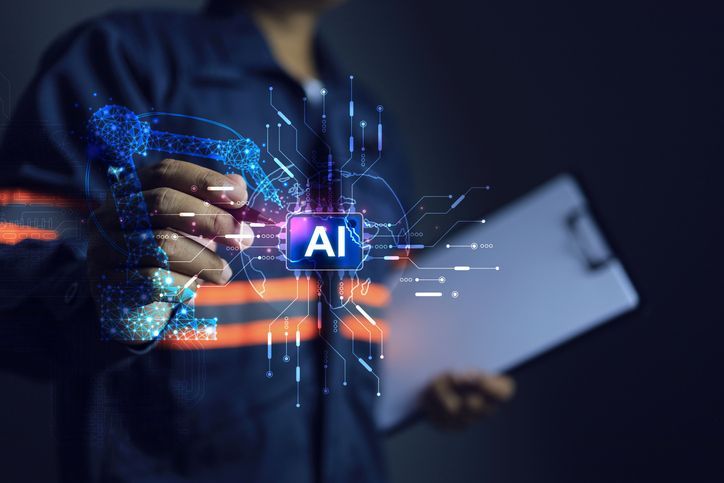
How AI Recruiting Software Is Changing Hiring and the Job Market
April 22, 2025 Written by Rafael Spuldar

Compare Providers
Download our outplacement comparison sheet
Request Pricing
Compare our rates to other providers
Artificial Intelligence (AI) is reshaping the hiring landscape in ways that were hard to imagine a decade ago. From sourcing talent to screening resumes and eliminating bias, modern AI recruiting software is transforming traditional HR functions and redefining how companies connect with candidates.
In this article, we’ll explore some stats and insights that will help you make sense of the AI recruiting revolution in the job market and better inform your own hiring processes.
The Urgent Need for Smarter Hiring
According to the US Bureau of Labor Statistics (BLS), the number of job openings in February 2025 remained high at over 7.6 million, while the average time to fill an open position continues to hover at around 44 days.
Meanwhile, top candidates typically only stay on the market for about 10 days. This gap creates intense competition for talent, and that’s where AI job recruiters step in.
AI-powered platforms drastically cut hiring times by automating time-consuming tasks, improving accuracy, and delivering a better experience for both employers and candidates.
Examples of AI Recruiting Software
AI recruiting software uses complex algorithms to identify high-quality candidates across job boards, social networks, and internal databases.
Tools like HireVue and SeekOut use natural language processing (NLP) and machine learning (ML) to evaluate resumes beyond keywords. They assess job history, education, skills, and even inferred traits like career progression and stability.
Eightfold is another AI recruiter that digs into profiles to map the most valuable candidates not based on keywords, but by fully understanding their potential based on their experience and skills.
Textio Loop is another tool that uses AI to project how diverse your applicant pool will be according to the job description you provide, giving you a diversity score to make things easier to understand and visualize.
Are you looking for ways to better align your workforce recruiting and retention with your business goals? Click below to download our free Careerminds Guide to Workforce Planning to help you maximize your talent planning and potential.
How AI Recruiters Are Changing the Game
Here are some of the most impactful ways that these AI job recruiter tools are revolutionizing the hiring process and job market:
Personalizing Job Matching
A major advantage of using AI recruiting software is its ability to customize candidate matching. Instead of relying on one-size-fits-all filters, AI recruiter platforms consider an employer’s past hiring patterns, performance data, and cultural values to recommend qualified candidates who are more likely to succeed in the role.
These systems continuously learn from historical data, increasing placement accuracy over time. For example, LinkedIn Recruiter uses AI to suggest candidates similar to those the employers have previously interacted with, streamlining the process significantly.
Automating Workflows
Administrative overhead is one of the biggest pain points in traditional recruiting. Human recruiters often spend hours on low-impact tasks, such as reading resumes, scheduling interviews, and handling follow-ups.
AI job recruiters solve this by integrating chatbots, like Paradox’s Olivia, that communicate with applicants 24/7, answer questions, pre-screen candidates, and coordinate interviews. This automation reduces recruiter workload and enhances the candidate experience by providing instant feedback and updates.
Reducing Hiring Costs and Turnover
Manual hiring is expensive. The good news? AI-powered hiring helps cut costs in a big way. Companies using AI recruiting software have reported 30% savings in cost-per-hire, according to a study by Deloitte. This statistic shows how effective automation can be in reducing operational burdens and financial overhead.
While hiring is costly, replacing an employee is even more so. According to the Society for Human Resource Management (SHRM), the cost of replacing a salaried employee is typically between six and nine months of their annual salary. These costs can escalate for higher-level positions, with replacements potentially costing up to 213% of the employee’s yearly salary.
By leveraging AI recruiting software, companies can improve hiring accuracy and retention rates, mitigating these substantial turnover costs.
Tackling Bias in Hiring
One of the most promising aspects of AI recruiter technology is its potential to reduce bias in hiring. AI systems can anonymize candidate information such as name, gender, and age during the initial screening, focusing strictly on skills, experience, and relevant qualifications.
Of course, bias in AI depends heavily on how the system is trained. Leading providers now prioritize ethical AI development, using diverse datasets and ongoing audits to minimize skewed outcomes.
The Equal Employment Opportunity Commission (EEOC) has also issued guidance encouraging employers to monitor automated hiring tools for potential discrimination, helping set needed standards in this fast-evolving space.
Enhancing Diversity and Inclusion
Diversity hiring has become a strategic priority for many organizations, and AI job recruiters can help advance these goals. AI tools can assess and adjust job descriptions for inclusive language, identify diverse candidate pools, and ensure equal screening standards across demographics.
According to a 2024 McKinsey report, companies in the top quartile for ethnic and gender diversity on executive teams were 39% more likely to outperform on profitability. AI recruiting tools are increasingly seen as allies in helping companies reach those benchmarks.
Preparing for the Future of AI Recruiting
AI recruiting software isn’t just about faster hiring—it’s about smarter, fairer, and more data-driven decision-making. As the technology becomes more sophisticated, we can expect AI to play a larger role in skills assessments, predictive analytics for career development, and even onboarding.
However, human oversight remains essential. AI can streamline the process, but people still need to make the final hiring decision, as they are ultimately responsible for equity and fairness.
AI Job Recruiters: Final Thoughts
The job market is moving faster than ever, and employers need to be prepared with agile solutions. By integrating AI recruiting software into their HR processes, organizations can gain a competitive edge, improve candidate experiences, and make more strategic hiring decisions.
While AI won’t replace recruiters, the role of the AI recruiter is to empower HR teams with insights and efficiencies that were once out of reach. In today’s talent economy, that makes all the difference.
At Careerminds, our goal is to foster both individual and organizational growth. Our industry-leading outplacement and talent development services can help you elevate the full potential of your workforce. To learn more, click below to speak with our experts and see if Careerminds is the right partner for your organization.
In need of outplacement assistance?
At Careerminds, we care about people first. That’s why we offer personalized talent management solutions for every level at lower costs, globally.



